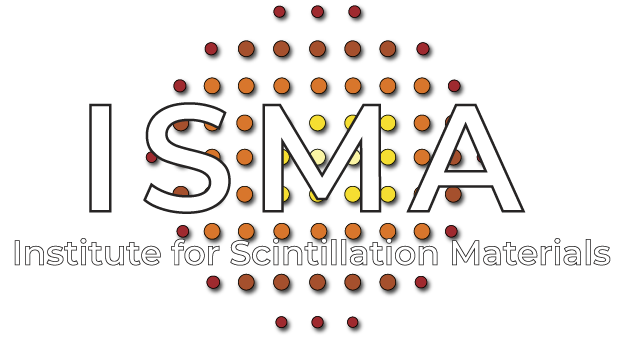The Institute of Scintillation Materials takes an active part in international scientific and scientific-technical cooperation within the framework of contracts and joint projects with foreign centers, firms and scientific organizations.
In 2013, a three-year joint SUCCESS project with Claude Bernard University (Lyon-1, France) was completed, implemented under a grant from the European Commission under the FP-7 program. Details can be found on the project website www.success.kharkov.ua
According to the program of joint actions between Ukraine and France in the field of scientific and technological cooperation "Dnipro" three-dimensional crystals of LGSO: Ce were obtained by the Czochralski method. The optical and scintillation characteristics of fibers and bulk crystals were compared. Experimental samples for testing at the European Center for Nuclear Research (Cern, Geneva) were prepared.
Under a cooperation agreement with the National Institute of Nuclear Physics (Italy), scientists at the Gran Sasso Laboratory synthesized radiation-pure oxides of lead, zinc and molybdenum for low-background detectors. The technical requirements and conditions of the contract for the production of low-background crystals of zinc selenide for the project on the registration of neutrino-free double beta decay were agreed.
Under the Eiffel program of the French government, ISMA graduate students were able to carry out researches in preparation for their theses in France (Claude Bernard University, Lyon-1).
Scientists of the institute maintain scientific relations with the Institute of Theoretical Physics and Materials Science Center, University of Groningen (Netherlands), University of Central Florida, Wake Forest University, University of Tennessee, Nanotechnology Center, Lawrence Livermore National Laboratory (USA), Optronic Materials Center National Institute for Materials Science (Japan), Paul Scherrer Institute, CERN (Switzerland), University Claude Bernard Lion I (France), Oxford University (UK), Humboldt University, University of Bayreuth (Germany), National Center for Nuclear Research, Otwock-Swierk (Poland), Institute of Physics of the Czech Academy of Sciences, Institute of Accelerating Systems and Applications (Greece), with Peking University (China), University of Tohoku (Japan), Institute of Nuclear Physics, University of Catania (Italy), Institute of Physics at University of Tartu (Estonia), University of Vilnius (Lithuania), University of the Witwatersrand (South Africa), firms "Folgat AG", (Germany), "Detec-Europe" (France), "Beijing DT Electronic Technology Co., Ltd" (China), "Tumast Automoto SRL" (Romania) and others.
Close scientific cooperation has been established with organizations and institutions of the CIS countries, namely: the Institute of Solid State Physics and Semiconductors and the Institute of Physics (Minsk, Belarus), Belarusian, Moldavian State Universities, L.M. Gumilev Eurasian National University (Kazakhstan), etc.
In 2013, a three-year joint SUCCESS project with Claude Bernard University (Lyon-1, France) was completed, implemented under a grant from the European Commission under the FP-7 program. Details can be found on the project website www.success.kharkov.ua
According to the program of joint actions between Ukraine and France in the field of scientific and technological cooperation "Dnipro" three-dimensional crystals of LGSO: Ce were obtained by the Czochralski method. The optical and scintillation characteristics of fibers and bulk crystals were compared. Experimental samples for testing at the European Center for Nuclear Research (Cern, Geneva) were prepared.
Under a cooperation agreement with the National Institute of Nuclear Physics (Italy), scientists at the Gran Sasso Laboratory synthesized radiation-pure oxides of lead, zinc and molybdenum for low-background detectors. The technical requirements and conditions of the contract for the production of low-background crystals of zinc selenide for the project on the registration of neutrino-free double beta decay were agreed.
Under the Eiffel program of the French government, ISMA graduate students were able to carry out researches in preparation for their theses in France (Claude Bernard University, Lyon-1).
Scientists of the institute maintain scientific relations with the Institute of Theoretical Physics and Materials Science Center, University of Groningen (Netherlands), University of Central Florida, Wake Forest University, University of Tennessee, Nanotechnology Center, Lawrence Livermore National Laboratory (USA), Optronic Materials Center National Institute for Materials Science (Japan), Paul Scherrer Institute, CERN (Switzerland), University Claude Bernard Lion I (France), Oxford University (UK), Humboldt University, University of Bayreuth (Germany), National Center for Nuclear Research, Otwock-Swierk (Poland), Institute of Physics of the Czech Academy of Sciences, Institute of Accelerating Systems and Applications (Greece), with Peking University (China), University of Tohoku (Japan), Institute of Nuclear Physics, University of Catania (Italy), Institute of Physics at University of Tartu (Estonia), University of Vilnius (Lithuania), University of the Witwatersrand (South Africa), firms "Folgat AG", (Germany), "Detec-Europe" (France), "Beijing DT Electronic Technology Co., Ltd" (China), "Tumast Automoto SRL" (Romania) and others.
Close scientific cooperation has been established with organizations and institutions of the CIS countries, namely: the Institute of Solid State Physics and Semiconductors and the Institute of Physics (Minsk, Belarus), Belarusian, Moldavian State Universities, L.M. Gumilev Eurasian National University (Kazakhstan), etc.
